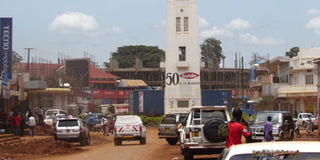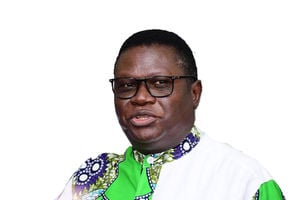Prime
Mbale town’s dream of city status can come true

How Mbale Town can attain city status. Photos by Fred Wambede
What you need to know:
The leadership of Mbale Municipal Council is pushing for city status. It is possible, if well planned.
The mess in which Mbale Town has plunged itself is not irredeemable. Urban planners, development analysts and government technocrats agree that the state of affairs can be fixed to contain the current pressures and direct future growth.
John Mushomi, lecturer, at Makerere University’s Centre for Population and Applied Statistics, says the situation is not the worst.
There are towns that are in a worse state than Mbale. A town cannot be expected to be what it was in the past. “It is not an isolated case. What happened to Mbale is similar to other towns like Kabale, Tororo and Kasese,” Mushomi says.
What needs to be done
He continues: “To begin to deal with this situation, the government should spearhead and own town development, town land, build infrastructure and direct private land owners in towns on the desired infrastructure that can be constructed on town land.”
It is not enough for the government to own land anywhere without having the control of shaping development on that land. An example Mushomi cites is Abuja, capital city of Nigeria, which he considers one of the most organised in Africa because the government took charge of it.
As an urban planner, he believes if the government and Mbale municipality authorities forget about donations, because it can only do so much in terms of developing the town, it will be a step in the right direction.
It is high time government did what it is supposed to do and leave a small bit to donors and private developers, who should be monitored in line with government’s priorities.
“Mbale’s development needs to be within a national context as opposed to the regional context. Government must wake up and take responsibility of championing a government-led urban growth and development strategy but not a people-led urban growth strategy,” he argues.
This means that responsibility of developing a town should be spearheaded by the government rather than the donors or private sector whose motives are not always at par. Mushomi speaks of promoting smart growth principles of compact cities/towns and mixed use development.
According to Municipal Research and Services Centre (MRSC), this is an urban planning model, which applies to a town of short distances with a large resident population, providing for opportunities for social interactions and environmental conservation.
This is based on an efficient public transport system, which encourages walking and cycling, low energy consumption and reduced pollution. It is also arguably a more sustainable urban settlement type.
He also suggests developing Mbale within well prepared and revised physical development plans at national, regional, district, urban and local levels and not according to political promises, international donation and emotion.
Authentic public private partnerships and political will see the town not only naturally mutate to a city status but reclaim its past glory—as the darling of East Africa.
Mutwalib Zandiya Mafabi, the mayor, says with proper funding, he will not only turn around the fortunes of Mbale, but also ensure that it attains a city status.
Currently, the municipality’s total annual budget is Shs20b, including Shs5b it collects locally. Nearly three quartres of that amount covers salaries and wages. The balance cannot fund a two-kilometre road. To do good work, he said, he needs more than Shs30b annually at least.
Stalemate
Every year, the municipality is expected to at least construct a kilometre of road. Of the 120km in the municipality, only 42km is tarmacked.
But with a World Bank loan of Shs10b to construct about three major roads in the central business area, a load has been lifted off the council’s shoulder. However, it has taken nearly a year to finish the project because of squabbles between the municipality leadership and the contractor.
Yusuf Wamara, Mbale Industrial Division’s chairperson for finance, said the contractor had raised the road so high without proper water outlets.
This means that when it rained, the town would be flooded. And for that, the contract had to be suspended.
Meanwhile, the mayor says, with collaboration of the technical wing, including involvement of enforcement agencies, the municipality has embarked on a cleaning-up mission dubbed “the transformation”.
With the transformation, all illegal structures will be razed.
The move has gathered momentum with the chairman of the traders in Mbale, Sulaiman Kiwanuka, backing it, saying it is the right thing to do.
As a result of this move, which has been intensified in recent months, make-shift businesses, which were causing congestion in the town are being cleared.
The plan
Operation Transformation, according to the mayor and Wamara, is a concept borrowed from the KCCA enforcement model.
After a meeting with KCCA executive director, Jennifer Musisi earlier in the year, Mbale Municipality technical and political representatives wing left City Hall convinced that Musisi’s approach is suitable for Mbale.
So they implemented it and the fruit seems visible, the challenge now is to maintain the focus of both the political and technical wing, something the mayor said is on his priority list.
The mayor also said expansion of the town is underway after spending about Shs800m to compensate National Forestry Authority (NFA).
In this deal, the NFA will be surrendering its 430 hectares of land in the town to the municipality authority in exchange of 550 hectares of land secured in Bulambuli—which is out of the town.
With that done, the mayor says the next phase will be demarcation with each part of the city being defined for particular activities.
He said a plan, although Daily Monitor did not see it, has been presented to the Ministry of Lands, Housing and Urban Development in consideration for a city status.
The deputy town clerk, Joy Manana, said the municipality must rise to the challenge for there is no excuse to fail.
“After 50 years of independence we cannot continue to be toddlers. We must start delivering and operation transformation is one such initiative,” she says.
“We need to ensure that poverty is reduced, unemployment is tackled, we need good infrastructure here, good offices and hotels and steady power. And to achieve all that we must change our attitude and face the challenge.”
In agreement with Manana, the Ministry of Lands, Housing and Urban Development will not act as as a rubber stamp, saying it must up its game and earn its place.
Execution
Joseph Walter Paddy, commissioner for urban development in the Ministry of Lands, Housing and Urban Development, says government is willing to support the town develop its roads, solid waste management and help it get the necessary funding but that will be tagged to accountability and transparency that the council demonstrates.
He said $150m (nearly Shs450tn) has already been secured from World Bank and Mbale is due to get its share to complete the construction of the stalled city roads.
He attributed the delay to assessment and review of the sites but said the government now has the money and funding of the projects will resume anytime soon.
As a way forward, Paddy says there must be stakeholder engagement to avoid squabbles that could derail the project.
He notes: “The municipality should engage everybody, including the private sector, the city dwellers, and academics among others on the future of the town. We want everybody to be on board and accountable.”

Various stakeholders agree that while Mbale Town cannot go back in time, adjustments can be made to accommodate proper urban planning.
Status
Currently, Kampala is the only city in Uganda. Among the 111 districts, there are 14 municipalities with Mbale being among the first to attain that status.
The creation of regional cities and boosting of infrastructure of towns such as Mbale creates a window of hope for better quality services to be extended to people outside Kampala city. Shs20b including locally collected revenue was the budget for Mbale town in 2014/15. In 2012/2013 budget, Shs15b was the money that was allocated to Mbale Municipality. In the 1998/1999 budget, Shs1.8b was the amount allocated to the municipality.
The making of a city
Although Mbale is among the towns being targeted as regional cities, along with Jinja, Arua, Mbarara and Gulu, it will not come on a silver platter though.
Responding to Mbale town agitation for the city status, Walter Paddy said: “As government, we cannot wake up one morning and declare that you are a city. We have to guide the process and assess its progress.”
He continues: “A city status goes together with service delivery and we have to ensure that happens. We cannot just wake up one morning and hand it to you. You must earn it. You must be worth the title—city.”
The regional city plan is part of the 2014 national development plan vision ,which focuses on urbanisation, among other pertinent issues.
Provisional results for the national population and housing census 2014 have showed increasing urbanisation levels, persistently high population growth rate, and uneven distribution of the population among administrative units, something the government seems keen to deal with.
And $150m (nearly Shs450tn) by the World Bank provided under the Municipalities’ Infrastructure Development Project in many ways aims to deal with urbanisation and related challenges.
Success stories
Although Dar es Salaam lost its status as the nation’s capital to Dodoma in 1974, it has remained an important and one of the largest cities in East Africa. Engineer Irenaeus Wandera Barasa, said Dar es Salaam was rehabilitated from a dusty town, to one of the largest in the region now. Transformation of Dodoma and Arusha are the other interesting lessons that Mbale town could pick a transformation leaf from.
Abuja the capital city of Nigeria is a planned city which was built mainly in the 1980s. It officially became Nigeria’s capital on December 12, 1991, replacing Lagos, though the latter remains the country’s most populous city.
According to John Mushomi, a lecturer at the Makerere University Centre for Population and Applied Statistics, Mbale Town can be transformed just the way Abuja was. He said it is not enough to own land in Abuja anymore as the government determines what you put on the land and in that light, making it one of the most organised cities in Africa.
But that can only happen if the government spearheads and owns town development.
Kampala Capital City Authority (KCCA) is responsible for the operations of Kampala, the country’s capital city. KCCA attempts to clean the city, have the street lights powered and create order benefiting of a city is lesson which Mbale town can learn from.
According to the President of the Uganda Institution of Professional Engineers (UIPE), Eng Isaac Mutenyo, the transformation happening in Kampala cannot go and unnoticed and Mbale Municipal council should borrow the same model in transforming Mbale town, something it is already doing through its operation codenamed transformation.




